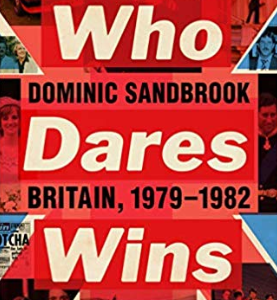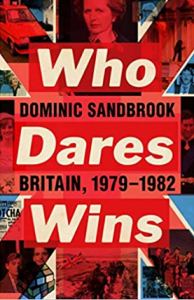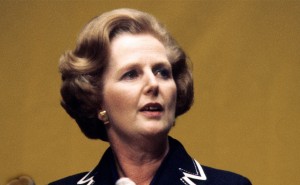
Controversial years of early 1980s



The Labour Party under the leadership of Michael Foot with the “longest suicide note in history” Labour’s 1983 election manifesto was deeply unpopular and it felt like a turning point in British politics.
Margaret Thatcher had came power in 1979 with a daring plan to reverse Britain’s decline into shabbiness and chaos, as factories closed their doors, dole queues lengthened and the inner cities exploded in flames, her radical medicine rescue the sick man of Europe or kill it off? The story of Tony Benn, Ian Botham and Princes Diana, Chariots of Fire, ZX Spectrum, Juilet Bravo and above all the most divisive Prime Minister of modern times – the Iron Lady, all featured in the book.
In “Who Dares Win” Dominic Sandbrook, looks at the time when Margaret Thatcher decisively broke with the post war Keynesian consensus and tolerated high unemployment as the price of defeating inflation.
Sandbrook who was four years old when Margaret Thatcher was elected in 1979 said he “read every edition of the The Time, The Guardian, The Mirror and The Express from early 1980s and dipped into countless other newspapers and magazines from the Sun to Smash Hits”.
Who Dares Win opens with a bang the conclusion of the 1980 Iranian Embassy siege and the rescue of the hostages by the SAS, revealing the attitude that captured those early Thatcher years.
The monetarist assault on the inflation, mass unemployment and the people’s march for jobs with the Labour Party split, the emergence of the Social Democratic Party, the election of President Ronald Regan , the deployment of cruise nuclear missiles , the protest of Greenham women and rejuvenation of the campaign for nuclear disarmament. Ken Livingstone’s Greater London Council and its experiments in municipal socialism, the introduction of “right to buy” to convert social housing tenants into homeowners , riots in Brixton and Toxtehas the price of defeating inflation, the new dispensation such the privatisation , defeat of Arthur Scargill’s miner’s union, the end of football hooligans wre still to come. Trade Union problem which had seemed insurmountable for more than a decade was ended when management’s right to manage was established beyond doubt by Michael Edwardes, head of British Leyland, a case study in the failures of state ownership of industry. Thatcher said “Economics are the method; the object is to change the soul”.
The public horror of Windrush scandal with the almost universal verbal acceptance –outside Home Office- tat African-Caribbean citizens are fully British, has its roots in the resistance that led to the riots. 1981 was designated information Technology Year by the government.
The Falklands War, total victory in South Atlantic brought with it the restoration of national pride that had its roots in memories of the Second World War but was in reality creation of something new – a relief that the decline of Britain was not inevitable as the political classes had accepted until Thatcher’s election.
The book reminds you that Thatcher was a leader whose greatest strength was her view, her certainty that things could, should and would be different.
Who Dares Wins: Britain, 1979-1982 by Dominic Sandbrook, Allen Lane £35, 976 pages.
